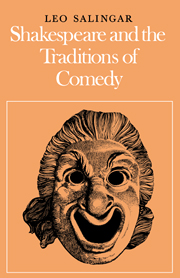2 - Medieval stage romances
Published online by Cambridge University Press: 04 December 2009
Summary
Si fait bon oÿr exemplaire
Et bonnes vertus raconter,
Dont on puet par raison monter
En l'estat de perfection.
L'Estoire de GriseldisIt hath been sung at festivals,
On ember-eves and holy-ales;
And lords and ladies in their lives
Have read it for restoratives.
The purchase is to make men glorious;
Et bonum quo antiquius, eo melius.
Gower, in PericlesSeveral of Shakespeare's comedies depict ‘rebels to Love’, somewhat like Chaucer's Troilus. Valentine, Berowne and his companions, and Benedick are such rebels at first among Shakespeare's men, Kate and Beatrice and Olivia among his women; while Adriana and Titania resemble them in their rebelliousness as wives. In all seven of the plays where these characters appear, there is a moment of deception for the rebel answering to his own self-deception, and at least a touch of farce in the process by which he is converted. On the other side, Shakespeare's plots depicting constant love are based upon romance. Constancy is first tried and then rewarded by Fortune.
Some of these plots deal with a daughter's flight from an angry father to the woods, where by the aid of chance she is both united with her lover and reconciled with her father. Such is the story of Silvia at the end of Two Gentlemen of Verona, where Shakespeare uses this motif for the first time, and where the intervention of the Outlaws redresses the lovers' ‘crooked fortune’ (iv.i.22); and such again is the story of Hermia, where in effect the fairies take the place of the Outlaws.
- Type
- Chapter
- Information
- Shakespeare and the Traditions of Comedy , pp. 28 - 75Publisher: Cambridge University PressPrint publication year: 1974
- 1
- Cited by



